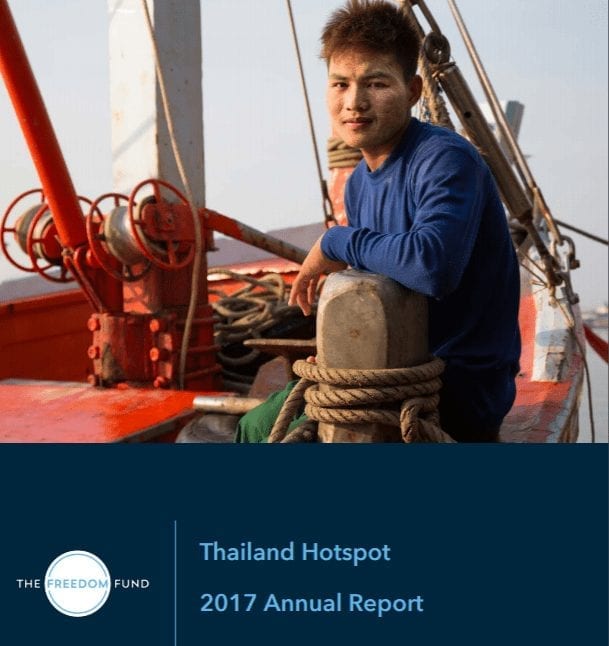
Thailand Hotspot: 2017 Annual Report
Thailand is the world’s fourth-largest seafood exporter, reaping over $6.5 billion in revenues a year. But the profitable industry supplying Americans and Europeans with cheap seafood comes at a high cost to both the environment and to hundreds of thousands of migrant workers. Overfishing and illegal, unreported, and unregulated (IUU) fishing has led to the depletion of resources pushing fishing efforts further off-shore, increasing the likelihood of IUU fishing, and compromising the sustainability of environmental resources. The increased effort for reduced catch as a result of overfishing/IUU fishing drives up costs, incentivising the use of forced labour.
The fishing and seafood labour force in Thailand is by a large majority composed of migrant workers from Myanmar, Laos and Cambodia. Labour brokers recruit from vulnerable communities, promising favourable employment in the construction, manufacturing, or agriculture industries. Migrants often incur debt from labour brokers, costs ostensibly associated with transportation and securing employment in Thailand. This ‘debt’ is often transferred by labour brokers to owners of seafood processing factories or fishing boats, resulting in bonded labour.
Research conducted by the Raks Thai Foundation indicates that up to 200,000 migrants working on fishing vessels are prone to exploitation, and even more are susceptible to unethical labour practices in the seafood processing sector. According to the UN, more than 130,000 migrant workers from Myanmar are victims of forced labour in Samut Sakhon, Thailand’s leading seafood processing region. A 2009 survey of Cambodian long-haul fishermen found nearly all those surveyed reported beatings to the head and body, inhumane working hours, and sleep and nutritional deprivation. Over half had witnessed the murder of a crew member by the boat’s captain. For those who are rescued, inadequate after-care services and financial barriers prevent migrants from remaining in Thailand to testify against their former employers.
The Freedom Fund strategy to significantly reduce slavery in the Thai seafood industry is organised around three objectives:
1. To incentivise and support the private sector to improve transparency and adopt ethical labour practices leading to an eradication of forced labour in the seafood supply chain.
2. To strengthen civil society organisations to monitor the situation on the ground and to empower migrant workers. Migrants workers will be better able to access relevant services and those who escape forced labour will be more likely to seek and access compensation and redress.
3. Increase pressure on the Thai government to reform the regulatory framework, uphold migrant rights, and challenge the impunity of traffickers.
